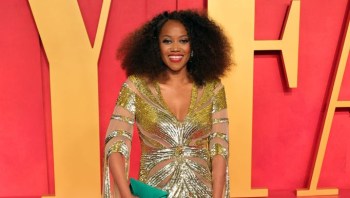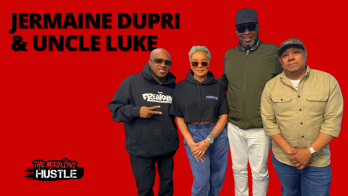The plan was to rock the mike, not cause an identity crisis.
In 2008, when Jay-Z was named as a headlining act for Britain’s fiercely rock-centric Glastonbury Festival — a first for any hip-hop performer, let alone one of rap’s epochal superstars — the island nation erupted in furious debate. They’re giving a rapper domain over one of rock’s elite events? Critics derided the decision as “a disaster” and “tragic,” assailing Glastonbury itself as “contaminated.”
To Jay (birth name: Shawn Corey Carter), the situation smacked of segregation. “That was the old guard standing in the way, saying, ‘This is rock music. This is sacred,’ ” he said, seated in his wood-lined corner office, a stone’s throw from Times Square. “It was one of those hurdles we had to break down.”
B-boy braggadocio is one thing, but a certain performance anxiety set in when the rapper first laid eyes on Glastonbury: nearly a quarter-million festival-goers camped out in a vast tent city surrounding the outdoor venue in the British countryside. Around 70,000 of them — some openly hostile — awaited his set. “It felt like we were invading a country,” Jay said. Not only did he manage to win over the crowd — thanks, in part, to his opening number, a cheeky cover of Oasis’ biggest hit, “Wonderwall” — but the artist known variously as Jigga Man and Young Hova in the process established a whole new enterprise. With what he calls his Glastonbury “game-changer,” Jay-Z suddenly became the most internationally popular live performer in hip-hop history.
“Jay-Z is more than a rapper,” said Ebro Darden, programming director of New York’s influential urban radio station Hot 97 FM. “People forget he has a platinum rock album — the mash-up thing he did with Linkin Park. He has done songs with Chris Martin and performed with Coldplay many times. Then add in [Jay’s] high profile and the big intangible: People believe what he’s saying in his music. He’s authentic.”
As a measure of his post-Glastonbury clout, this year Jay will take his show on the road to such top-tier summer music fests as Tennessee’s Bonnaroo Music & Arts Festival and the Summer Sonic Festival in Japan. And come Friday, Jay-Z arrives as the first straight-up rapper to claim a headlining berth at Coachella. Others have graced the lineup — Jurassic 5, Kool Keith, MURS, Kanye West and Aesop Rock — but none have done it at the top of the ticket.
“In hip-hop, there’s not many great performers,” Jay-Z, 40, said. “I look outside the genre, measuring myself against others. I look at Madonna’s production and envy that. . . . I look at the way U2 can command an audience. Bono’s a performer pretty much like I am. He’s not a dancer; he’s not jumping around. He’s having a conversation.”
To be sure, such platinum-anointed MCs as 50 Cent and Lil Wayne can book arena tours and rock stadiums while never entirely crossing beyond their “urban” core audiences. Eminem remains a huge international draw but has until very recently resisted the lure of the festival stage. And West enraged fans when he headlined Bonnaroo 2008 by refusing to take the stage until just before sunrise.
But as Coachella’s founder and operational mastermind Paul Tollett points out, Jay-Z is the only rhyme-spitter in the game today with enough big hits (he’s topped the national album chart 11 times in a 15-year career and created many of the most anthemic street bangers of the modern hip-hop era, including “Big Pimpin’ ” and last year’s “Empire State of Mind”), street cred, Twitter-worthy showmanship and mass appeal to connect with the desert festival’s discerning audience. Moreover, at a precarious time in the live music biz, organizers are looking to Hovi Baby as a solution.
From Jay’s perspective, live performances are vital in a time when music sales continue downward.
“It used to be that making albums was most of what you do and performing was like an afterthought,” he said. “But now, it’s like 50-50. . . . I may go make an album just so I can go and perform.”
In the meantime, there is one trapping of the festival circuit that holds particular resonance for him. It has to do with fans throwing up the “diamond cutter,” Jay-Z’s trademark hand gesture.
“There’s nothing like seeing 100,000 diamonds,” said Jay.
In fact, the rapper’s use of the diamond gesture resulted in a recent segment on National Public Radio questioning his links to Freemasonry and subversive imagery. Placing himself within the continuum that includes Led Zeppelin, KISS and the Beatles — acts who have been accused of masking dark, cultish ideas in pop trappings — Jay-Z’s face lighted up with a huge grin.
“Yeah,” he exclaimed. “I know I’m a rock star now.”
–Chris Lee
Photo: Kevin Winter / Getty Images.












